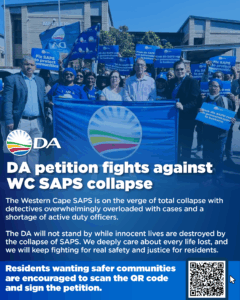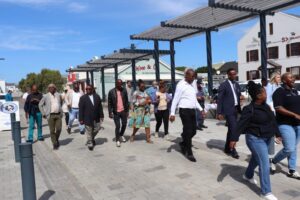Attention editors: Please see English audio by MPP Gillion Bosman attached.
In an urgent meeting held yesterday afternoon, managing figures in the South African Police Service detailed their responses to a worrying upsurge in gang-related killings in the Western Cape. The last week has seen the shooting of eight people in Khayelitsha and the killing of an innocent 16-year-old girl in the crossfire of a gang-related incident, among other incidents.
According to the SAPS, the period of 1-22 April saw a sharp increase in mass murders, with the majority of incidents relating to gang violence and retaliation/revenge. SAPS organised crime specialists present at the meeting stated that the violence is driven by an upheaval of the Cape Town underworld’s powers structures as smaller gangs form fractious alliances to usurp the control of larger, more established criminal syndicates over Cape Town’s lucrative drug trade.
SAPS management disclosed that they have deployed small amounts of additional resources from the Anti-Gang Unit, Operation Restore, Operation Lockdown, the Extortion Team, and have deployed specialised units as combat teams in the most violence-afflicted areas. It is encouraging to note the SAPS taking a multi-pronged, data-led approach to the problem, and to note the implementation of a similar deployment methodology to that employed by the Western Cape Government’s LEAP Officers. However, these additional deployments do not come anywhere near providing the proper resources to fight crime – and pale in comparison with the Western Cape Government’s concerted efforts to fight gangsterism, even with more limited resources.
By SAPS’ own admission, the Western Cape needs at least three thousand more SAPS members to reach a baseline of law enforcement capacity, and more than ten thousand more to fight crime effectively. 77% of Western Cape SAPS precincts remain understaffed, and fewer than three thousand detectives remain active in the Western Cape. More than this, SAPS deploys the resources it does have inefficiently and without due consideration for the realities of where police are needed: several affluent, low-crime areas find themselves with surpluses of personnel, while high-crime areas such as Gugulethu or Nyanga see one SAPS member responsible for the safety of more than 800 or even 1 000 residents.
Until these issues are fixed – whether by SAPS commanders or as the result of a devolved police service under the control of the Western Cape Government – any deployment of small numbers of specialised units sadly remains a band-aid on a bullet wound.
DA Western Cape Spokesperson on Community Safety Gillion Bosman says: “Whilst it is encouraging to see SAPS responding to the problem of increased mass murders in the Western Cape, it is clear that no amount of effort can resolve the catastrophic over-centralisation and poor resource allocation of a failed national police service. The only real response to organised crime that SAPS can offer is simple: Bheki Cele must resign, and allow leaders with proven track records in crimefighting to take the reins.”
“This sentiment was clear last night, when I and provincial Minister Reagen Allen met with safety stakeholders in Athlone, near the site where a 16-year-old student was tragically caught in gang crossfire. The onus is on us as leaders to provide better solutions to safety in our communities.”









